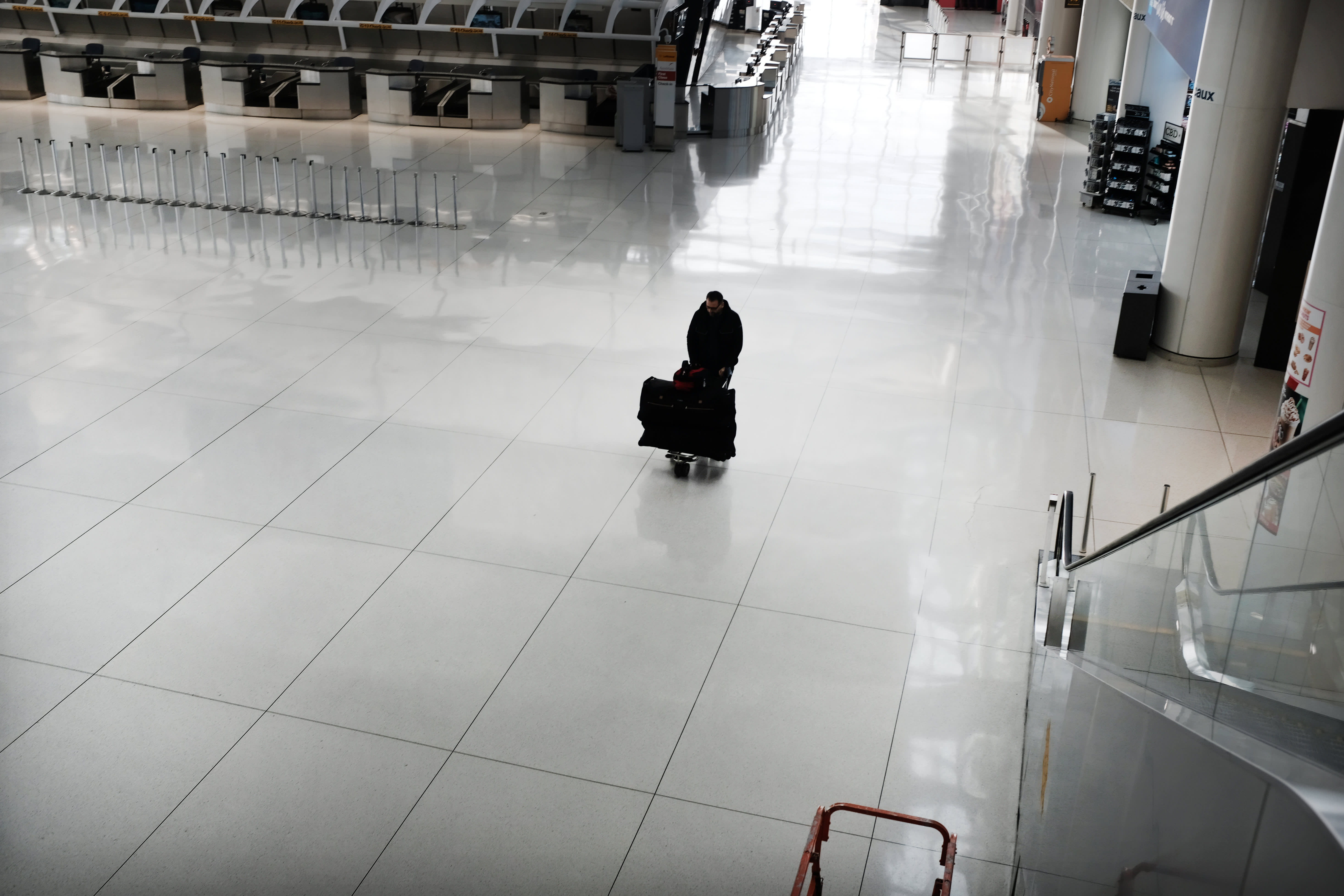People walk through a sparse international departure terminal at John F. Kennedy Airport as concern over the coronavirus grows on March 7, 2020 in New York City.
Spencer Platt | Getty Images
The U.S. travel and tourism industry could lose at least $24 billion in foreign spending this year because of the rapidly spreading coronavirus, according to data produced by Tourism Economics and first seen by CNBC.
That would be equivalent to about seven times more than the industry lost during the SARS outbreak in 2003, according to the data.
Tourism Economics, which tracks all travel spending – including on hotels, restaurants, theme parks and attractions – based its projections on the assumption that the coronavirus would be contained in six months. Foreigners typically spend around $256 billion on U.S. travel and tourism a year.
The World Health Organization officially dubbed the novel coronavirus, called COVID-19, a global pandemic on Wednesday. There have been more than 124,000 infections worldwide, and at least 4,589 deaths.
China, which is the epicenter of the outbreak, represents 7% of foreign travel spending in the U.S., up from 1% in 2002.
Amid mounting travel restrictions and growing fear of COVID-19, Tourism Economics is forecasting a 10% drop in international visits to the U.S a year, about double the decline the U.S. faced during the outbreak of severe acute respiratory syndrome, or SARS, in 2003.
This implies 8.2 million lost visitors in one year, even more than the 7.7 million international travelers lost in 2001 and 2002, after the 9/11 terrorist attacks.
In all, it anticipates 825,000 jobs could be lost in the industry, which also includes many small businesses.
“As it’s become a true pandemic, it’s affecting level of travel: travel advisories, companies canceling travel, and traveler behavior, ” said Adam Sacks, president of Tourism Economics. “There is a deep risk aversion when a trip is a voluntary activity. Even if a flight exists and borders are open.”
Globally, Tourism Economics expects travel to fall 9.1% this year, the largest drop ever in the past 40 years its tracked.
“This situation is truly unprecedented,” said Sacks.
The U.S. Travel Association, which represents roughly 150 travel-related organizations has sought to calm nerves. It has urged “fact-based decisions” around traveling, stressing that “for the overwhelming majority, it’s OK to live, work, play and travel in the U.S.”
But that hasn’t been enough to stave off travel restrictions, canceled conferences and general anxiety. Shares of MGM Resorts International closed down 10%, Marriott International down 8.9% and Expedia was down 10.8%.
Keeping the lights on
Facing down that pressure, the industry is pushing for relief from the federal government. President Donald Trump has already signed an $8.3 billion aid package aimed in part at helping states pay for the costs of fighting the outbreak and vaccine development.
Now lawmakers on both sides of the aisle are discussing putting together at least one more package aimed stemming the financial loss, as well as the human toll.
As part of those efforts, the travel and tourism industry is asking for relief including tax credits for employee retention, which would give employers an income tax credit for paying workers even while their business is inoperable, a person familiar with the industry’s strategy told CNBC.
It is also pushing for deferment of quarterly tax payments and the ability to carry back net-operating-losses.
The push comes as the debate over how to direct funds and resources has taken over Washington.
Democrats led by House Speaker Nancy Pelosi and Senate Minority Leader Chuck Schumer have said they will emphasize “people-focused initiatives” like paid sick leave and free coronavirus testing. Senate Democrats on Wednesday unveiled proposals including small business grants, federal funding for local communities and emergency unemployment insurance.
The White House, meantime, has floated ideas including a possible payroll tax cut and small business loans. Trump has said he will work with the airline and cruise ship industries to find relief.
A key point of contention between the Democrats and Republicans is whether any corporate assistance qualifies as a “bailout.” There is lingering anger over the government’s handling of the bank bailout in 2008, which some have argued left Main Street behind.
Adding to the sensitives in the travel and leisure industry is the fact that Trump himself owns a hotel business.
Proponents, though, argue that the travel industry doesn’t bear the same responsibility that the banking industry did during 2008’s market turmoil. That year, the financial system was bailed out despite Wall Street receiving much of the blame for causing the crisis.
Market experts and industry insiders have warned that a weakened tourism industry could have significant ripple effects that could hurt Main Street.
Former Nasdaq CEO Bob Greifeld on Tuesday warned that a significant blow to the tourism industry could launch a recession.
“We never had this situation where you had tourism being such a large part of the global economy. That did not exist in years past. Tourism has increased greater than GDP growth for the past 10 years,” Greifeld said.
